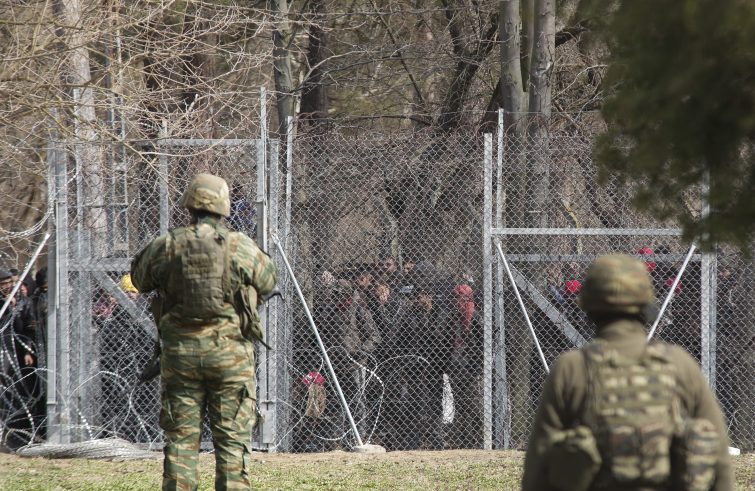
Clashes broke out on the Greece-Turkey border where tens of thousands of refugees and immigrants are attempting to enter Europe, rejected by the Greek Police and Army. As the pressure increases, Greece is deploying additional riot police. Most refugees intend to continue their journey peacefully, but some aggressive young people have engaged in clashes with Greek border police. Last Friday Turkish President Recep Tayyip Erdogan announced he would allow the transit of migrants to EU countries as a result of the intensification of hostilities in Idlib, Syria, where Turkish troops are deployed, alongside Islamist militiamen, opponents of the Assad regime. Erdogan’s choice is motivated by a request to the EU to comply with its commitment of 6 billion Euros of humanitarian aids to Ankara to finance the reception not only of Syrians, but of all refugees fleeing hunger and war under the accord stipulated in 2016 with EU Member States.
 Even the number of people crowded along the 120 km-long Greek-Turkish border, delimited for the most part by the river Evros, is the subject of dispute: according to the IOM (International Organization for Migration) they number more than 13,000, 10,000 for the Greek authorities and 100,000 for the Turkish ones. But there is consensus on the fact that the situation could escalate in the coming weeks. In an attempt to stop the exodus to Greece, Prime Minister Kyriakos Mitsotakis has announced the suspension in asylum applications for the whole month.
Even the number of people crowded along the 120 km-long Greek-Turkish border, delimited for the most part by the river Evros, is the subject of dispute: according to the IOM (International Organization for Migration) they number more than 13,000, 10,000 for the Greek authorities and 100,000 for the Turkish ones. But there is consensus on the fact that the situation could escalate in the coming weeks. In an attempt to stop the exodus to Greece, Prime Minister Kyriakos Mitsotakis has announced the suspension in asylum applications for the whole month.
Migrants on the Balkan route. “These poor people are under enormous pressure,” commented to SIR Msgr. Sevastianos Rossolatos, Archbishop of Athens and President of the Episcopal Conference of Greece.
“Migrants are clashing with Greek police who try to prevent them from entering our country as well as with Turkish authorities who force them to enter the country after having offered them free rides on trains, buses and taxis to reach areas along our borders,” he said. “They are living in desperate conditions, they sleep outdoors and have no assistance.”
“These refugees arrived in Turkey a long time ago, most of them housed in the district of Istanbul,” added the Archbishop of Athens. “Among them, according to media reports, there are also prisoners freed by the Turks. There are no refugees coming from Idlib, where the ongoing hostilities are now taking place.” “The Turkish troops are reportedly cutting through barbed wire fences at the Greek border in order to facilitate entry into Greece – Msgr Rossolatos pointed out -. It is widely acknowledged that Turkey’s plan is to push refugees into Greece in order to exert pressure on the EU.”
 Migrants arriving by sea. “There’s only so much we can do. The government is attempting to set up new reception centres for refugees on the islands. The military and police deployed to the land border with Turkey are trying to block the flow of Syrian and other refugees seeking to enter the Country after Turkish President Erdogan opened the doors”, Father Antonio Voutsinos, president of Caritas Greece, told SIR. “A massive flow of people are arriving from Turkey towards Greece and it’s impossible for us at Caritas Greece to arrange assistance for them right now. We don’t have adequate resources. It’s a phenomenon that caught us unprepared. We didn’t expect it. Even migrant reception camps in Lesvos, where a child died when a boat full of migrants capsized, in Chios and Samos, are on the brink of collapse.”
Migrants arriving by sea. “There’s only so much we can do. The government is attempting to set up new reception centres for refugees on the islands. The military and police deployed to the land border with Turkey are trying to block the flow of Syrian and other refugees seeking to enter the Country after Turkish President Erdogan opened the doors”, Father Antonio Voutsinos, president of Caritas Greece, told SIR. “A massive flow of people are arriving from Turkey towards Greece and it’s impossible for us at Caritas Greece to arrange assistance for them right now. We don’t have adequate resources. It’s a phenomenon that caught us unprepared. We didn’t expect it. Even migrant reception camps in Lesvos, where a child died when a boat full of migrants capsized, in Chios and Samos, are on the brink of collapse.”
“In these camps, where Caritas is present, migrants from Turkey continue arriving by sea. The Turks transport these poor people on crowded boats to our islands. The smugglers disembark the migrants once they are approximately 50-100 meters from our shores, leaving them in the middle of the sea. They risk dying in this way. We can’t abandon them.”
“Until a couple of months ago, migrants hosted in these centres were one-fifth of those living there now, numbering almost 25,000. Lesvos has a reception capacity of 3000. Thus thousands of people are living near the camps, housed in tents and makeshift shelters in very poor conditions. Many of them are women and children”. In order to meet their needs, Caritas Greece is trying to set up a joint relief program with Caritas Internationalis and other European Caritas. Father Voutsinos described a “deteriorating situation. In Turkey about 3.5 million refugees are ready to leave. The problem is not only humanitarian but also political.
Migrants are being used to exert political pressure on the EU
that had closed its borders also 5 years ago. Nothing has changed since then.” It was reported this morning that the EU Commission President Ursula von der Leyen, EP President David Sassoli and European Council President Charles Michel will join Greek Prime Minister Kyriakos Mitsotakis at the Greece-Turkey land border tomorrow. Mitsotakis announced on Twitter: “An important statement of support by all 3 institutions at a time when Greece is successfully defending EU borders.”











